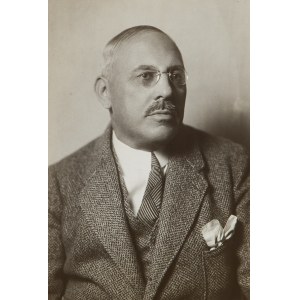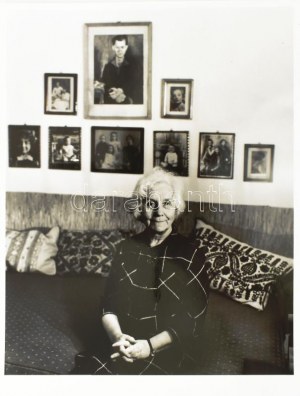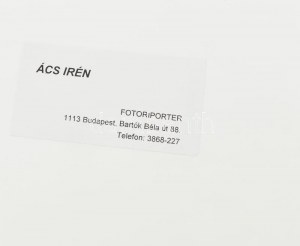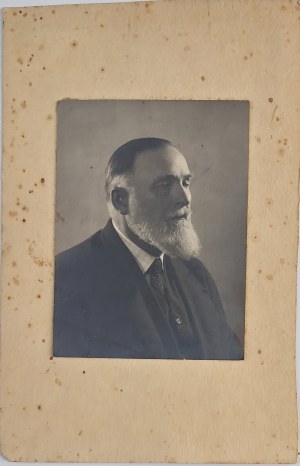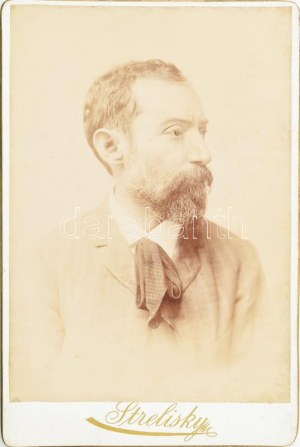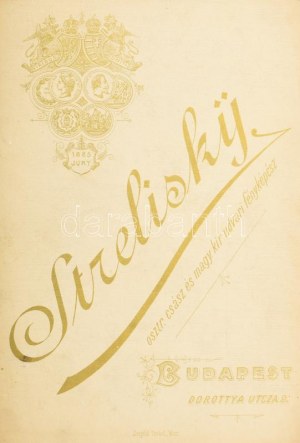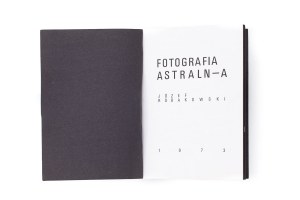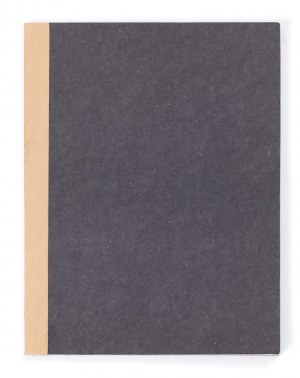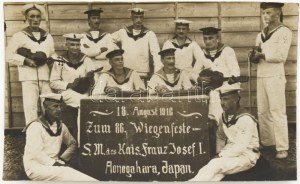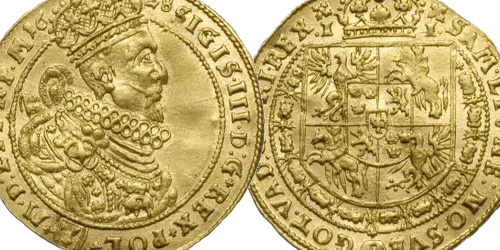ATELIER RUDOLF LECHNER, WILHEM MÜLLER
(Vienna 1822 - 1895), (Vienna 1849 - 1928 Vienna)
Portrait Josef Hoffmann
photography, 16,7 x 11,3 cm
Portrait Atelier R. Lechner (wilh. Miller) Vienna I, Graben 17, ex Collection Schulda-Müller, Salzburg, 1981, Collection Erich Gusel, Langenzersdorf
Provenance: Carla Hoffmann, private property Vienna
ESTIMATE °€ 300 - 1.500
START € 200
Portrait photography of the Austrian Architect, Interior Designer, Craftsman and Designer Josef Hoffmann. Viennese portrait photography from the 1930s. Hoffmann is considered the most important architect of the 20th century in Austria, along with Otto Wagner and Adolf Loos. Studied architecture at the Academy of Fine Arts in the class of Otto Wagner. In 1895, with Josef Maria Olbrich, Carl Otto Czeschka, Koloman Moser, and Leo Kainradl, member of the "Siebener-Club". Founded the Vienna Secession in 1987 with Gustav Klimt, Koloman Moser, Josef Maria Olbrich, Maximilian Kurzweil, Josef Engelhart, Ernst Stöhr, Wilhelm List, Adolf Hölzel as a split from the Künstlerhaus. Was professor at the Vienna School of Applied Arts from 1899 to 1936. Founded the Wiener Werkstätte together with Koloman Moser in 1903. In 1912, founding member of the Wiener Werkbund. Arranged many exhibitions, co-founder of the Kunstschau. Initially influenced by French Art Noveau, later influenced by Scottish architect Mackintosh and the British Arts and Crafts Movement. Interested in the creation of spatial art and the idea of the total work of art. Architectural designs include the Sanatorium in Purkersdorf, (1903), the Palais Stoclet in Brussels (1905-1911), interior of the Kabarett Fledermaus (1909), Villa Skywa-Primavesi (1913-1915), Austrian Pavilion for the Cologne Werkbundsiedlung (1914), Austrian pavilion at the Arts and Crafts Exhibition in Paris (1925).
The architect, designer, teacher and exhibition organizer Josef Hoffmann (1870-1956) is one of the central figures of Viennese Modernism and the international life reform movement around 1900. He is one of the most important Austrian architects of all. His work, which spans six decades, has been honored with numerous national and international awards. Josef Hoffmann was born as Josef Franz Maria Hoffmann in Pirnitz and grew up in a well-to-do family. The father Josef Hoffmann was mayor and co-owner of a textile factory; the mother Leopoldine Hoffmann, née Tuppy, ran the household with many children. Joseph was the only son; he grew up with three sisters, two other siblings had died shortly after birth. After high school in Iglau (1879-1886) he attended the higher state trade school in Brno (1887-1891), followed by a year's work in the military construction office in Würzburg. In 1892 he came to Vienna, where he became a student of Carl von Hasenauer at the Academy of Fine Arts and from 1894 studied architecture with Otto Wagner. After his diploma (July 1895) he traveled to Italy with a travel grant (Rome Prize). Returning to Vienna from Capri, Hoffmann entered Wagner's studio in 1896/1897. From 1898 he worked as an independent architect and designer. As early as 1895, Hoffmann was a member of the "Club of Seven" along with Josef Maria Olbrich, Koloman Moser (Kolo Moser), C.O. Czeschka and Leo. In 1905 he left the Vienna Secession with the so-called "Klimt Group". In 1938/1939 and from 1945 to 1956 Hoffmann was again a member of the Secession and was the association's president from 1948 to 1950. From 1899 to 1936 Hoffmann was a professor at the Vienna School of Applied Arts (class for architecture). After his (involuntary) retirement, he received a teaching positions at the University of Applied Arts (1937) and the Academy of Fine Arts (1946-1947). On May 1, 1903, he also founded the Wiener Werkstätte together with Kolo Moser and with the support of the banker Fritz Waerndorfer, for whom Hoffmann remodeled his villa at Weimarer Strasse 45 in 1903/1904.
In addition, Josef Hoffmann was a founding member of the Austrian Werkbund in 1912. From 1903 to 1922 Hoffmann was married to Anna Hladik. Their son Wolfgang, with whom he had a difficult relationship throughout his life, was born in 1900. In 1925 Josef Hoffmann married Karla (Carla) Schmatz. Hoffmann's students included Carl Witzmann, Oswald Haerdtl and Otto Prutscher. In addition to his teaching activities, Hoffmann designed many exhibitions and was also a co-founder of the "Kunstschau". Hoffmann developed a lively building activity in Vienna, which reached its peak in the years before the First World War. With the Purkersdorf sanatorium, which he built in 1903 with the help of Berta Zuckerkandl, Hoffmann became one of the most important architects of the new architecture. Hoffmann made his internationally recognized name by building the Palais Stoclet in Brussels, a masterpiece of post-impressionism and symbolism (1905-1911), in the interior design of which Gustav Klimt played a key role. In Vienna, Hoffmann designed, among other things, the business portal of k. and k. Court and State Printing Office (1908), the interior design of the "Fledermaus" cabaret (1909) and the renovation of the Graben Café (1912). He designed the Austrian pavilion for the Cologne Werkbund exhibition in 1914 as well as for the arts and crafts exhibition in Paris in 1925. After the First World War he built residential complexes for the city of Vienna from 1924, for example the Winarskyhof and the Klosehof. In 1929 he designed a project for an art gallery on Karlsplatz, which was never realised. He built houses 8, 9, 10 and 11 in the Werkbundsiedlung. entrusted with the construction of the House of the Wehrmacht in Vienna.
PLEASE NOTE:
The purchase price consists of the highest bid plus the buyer's premium, sales tax and, if applicable, the fee of artists resale rights. In the case of normal taxation (marked ° in the catalog), a premium of 24% is added to the highest bid. The mandatory sales tax of 13% is added to the sum of the highest bid and the buyer's premium. The buyer's premium amounts to 28% in case of differential taxation. The sales tax is included in the differential taxation.
Recently viewed
Please log in to see lots list
Favourites
Please log in to see lots list



